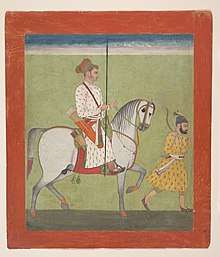Jhujhar Singh
Jhujhar Singh was a raja of the Orchha region in India during the 17th century.

Jhujhar Singh was the first-born son of Vir Singh Deo and the senior of his three queens.[1] In 1626,[2] he succeeded his father as ruler and determined not to remain a vassal of the Mughal Empire as his father had been. His attempt to assert independence from the reigning emperor, Shah Jahan, led to his downfall. The Mughal army, which was led by the teenager Aurangzeb, invaded his lands, conquered them in 1635 and forced Singh to retreat to Chauragarh, where he was killed by the Gondi people.[3]
The events that followed the Mughal conquest were the first known example of the Muslim Aurangzeb's religious intolerance. Singh's female relatives were enslaved and two of his sons were forcibly converted to Islam; a third son, who refused to convert, was executed. The royal palace in the town of Orchha was converted into a mosque.[3]
References
Citations
- Jain (2002), p. 84
- Michael (2009), p. 728
- Mehta (2005), pp. 105-106
Bibliography
- Jain, Ravindra K. (2002), Between History and Legend: Status and Power in Bundelkhand, Orient Blackswan, ISBN 978-8-12502-194-0
- Mehta, Jaswant Lal (2005), Advanced Study in the History of Modern India 1707-1813, Sterling Publishers, ISBN 978-1-93270-554-6
- Michael, Thomas (2009), Cuhaj, George S. (ed.), Standard Catalog of World Coins, 1801-1900 (6th ed.), Krause Publications, ISBN 978-1-44022-801-8